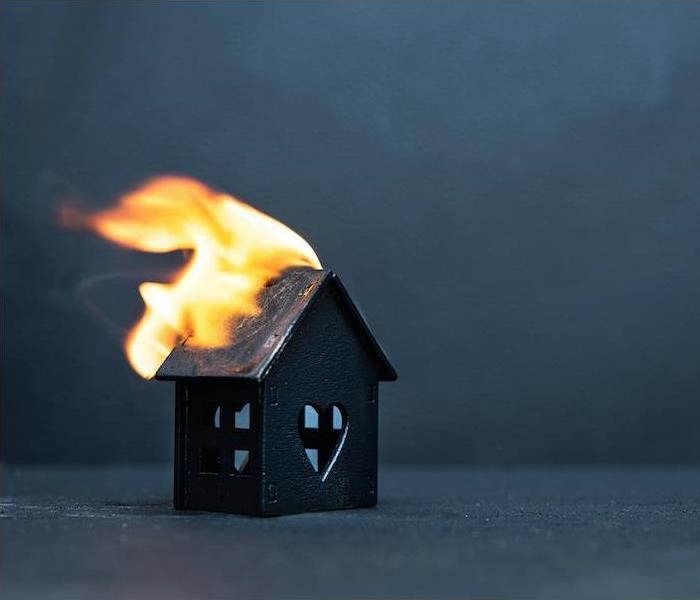Did You Know About These Hidden Fire Damage Hazards In Your Home?
7/17/2020 (Permalink)
SERVPRO warns Onondaga Hill homeowners about unexpected fire damage risks.
Onondaga Hill homeowners know the importance of preventing home fires if possible. Although there is always a risk of a home fire, no matter how careful you are, it’s a good idea to eliminate hazards.
There is a lot of information on the internet and from local fire departments warning Onondaga Hill residents about the risk of fire damage. However, most fire prevention campaigns cover obvious fire risks. There are also many lesser-known risks, and knowing about them can help you keep your home safe from a blaze.
What are some of the better-known fire risks?
You are probably already aware of some of the more common issues that can cause your home to catch fire. These include:
Leaving hot stove pans unattended or cooking with the heat turned up too high.
Leaving a burning candle of any other open flame unattended.
Failure to properly maintain electrical equipment, especially sockets and cords.
Forgetting to clean the lint catcher out in your dryer regularly.
SERVPRO recommends staying aware of all these potential problems and fixing them before a blaze can start. However, it’s also a good idea to familiarize yourself with some of the lesser-known fire risks around your home.
What are some of the lesser-known fire risks?
SERVPRO wants to make local homeowners aware of some less common fire hazards so they can take action today and hopefully prevent a disaster. Here are some things you probably have not thought of, along with tips on making your home safer:
Laptops – laptops can overheat and start a fire. To use your computer responsibly, SERVPRO suggests keeping it away from bed clothes or blankets and only using it on a hard surface such as a table. You can also purchase inexpensive laptop cooling trays that sit beneath the machine and ensure a flow of air.
Piles of paper – it only takes an open flame or heat from an appliance to set a stack of documents ablaze. Make sure to keep your records in a cool and well-ventilated area, and if the pile is unusually large, you should split it up into smaller piles.
Dust – dust can accumulate around electrical outlets, sockets, and heaters and cause a spark that starts a fire. When cleaning your home, be sure to vacuum or dust around all such areas to prevent problems.
Crumbs in the toaster – crumbs might be small, but if enough of them accumulate in the bottom of your toaster, they can start a kitchen fire. Clean your toaster after every use so the crumbs cannot build up.
Clutter – a cluttered home means more fuel for a fire, plus if the clutter is in the way of a door, you could find yourself trapped inside a room. Set aside time one weekend to declutter your home and make a plan to keep it that way.
Are there any lesser-known fire risks in my garden?
People don’t think of their garden as a fire hazard, but there are some risks:
Leaves in the gutter – if the weather gets dry enough to start a fire, leaves in the gutter provide quick kindling and can spread the flames to your home. Clean out your gutters regularly whatever the weather to prevent a fire risk (and keep your gutters from overflowing with water, too.)
Dry vegetation – just like leaves, dry vegetation provides fuel for a fire. If your garden has piles of dry leaves or sticks, dispose of them sooner rather than later.
Charcoal – grilling in the garden is fun, but charcoal can re-ignite itself and cause a blaze. Take care when disposing of the charcoal after a grill-out. You should place leftover charcoal in a metal bucket with a tightly fitting lid and do not dispose of it until you are sure it has cooled completely.
Storage of oil or chemicals – if you have oil or chemicals for use in the garden or home, be mindful of how you store them. Store flammable materials carefully away from any elements that might catch fire.
How can I reduce the chance of fire damage to my house?
SERVPRO recommends making routine fire safety part of your home routine. Set aside time in your schedule to regularly clean your gutters, tidy your garden, hoover, and dust the corners of your home, and take care of clutter. Always be vigilant for any fire hazards and take steps to reduce the risk as soon as you spot a potential problem.
It’s far better to take some time to mitigate the risks than deal with the aftermath of a home fire.
Sometimes accidents happen, and even if you are careful, there might be a home fire. We all hope a blaze in the home won’t happen to us, but if you are unfortunate enough to face a home fire, SERVPRO of SW Onondaga County is here to help. Call us on (315) 488-3900 for assistance.






 24/7 Emergency Service
24/7 Emergency Service
